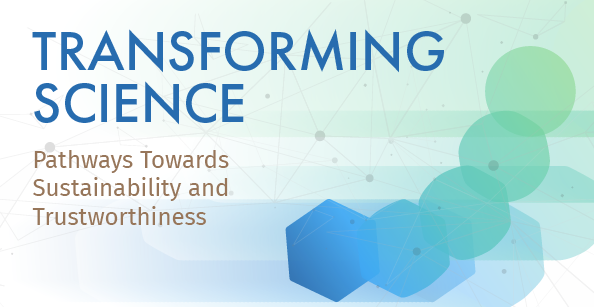Transforming Science: Pathways Towards Sustainability and Trustworthiness

Science plays a fundamental role in helping us to cope with the complexity of today’s natural and social systems. A silver lining of the pandemic has been the demonstrated capacity of individuals, society at large, and the science community to adapt rapidly. Current and future crises and abrupt transitions will continue to require scientific institutions to transform research cultures, trust-building strategies, and science advice mechanisms. The consequences of this transformation can be seen as two-sided: from an inspiration to tackle complex global emergencies such as climate change or future pandemics, to a rise of societal expectations and demands towards research. Are we ready to transform science for the future?
Themes of the Symposium
- Transforming Science for the Future
- Science-Policy Relations in an Age of Complexity
- Transforming Research Cultures
- Towards Climate Sustainability in the Academic System
Symposium organised by ALLEA (All European Academies), KVAB and ARB (Académie Royale de Belgique). The symposium is expected to be held in person at the Academy Palace in Brussels on 11-12 May 2022. The organisers will fully implement the official Covid-19 measures and follow current best practices for public events and international travel. The symposium will also be livestreamed for those who wish to participate digitally.
May 11th 2022
17:00 – Symposium Opening
Prof Didier Viviers
Permanent Secretary of the Royal Academy of Sciences, Letters and Fine Arts of Belgium (ARB)
Prof Antonio Loprieno
President of ALLEA
17:25 – Transforming Science for the Future
Thomas Dermine
Belgian State Secretary for Scientific Policy, Recovery Program and Strategic Investments
Mariya Gabriel
European Commissioner for Innovation, Research, Culture, Education and Youth
18:05 – Keynote
Prof Marion Koopmans
Director of the WHO Collaborating Centre for Emerging Infectious Diseases at Erasmus MC
18:45 – Reception
May 12th 2022
Session 1: Science-Policy Relations in Times of Complexity
The world around us seems increasingly unpredictable and the challenges society is faced with appear to become ever more complex and interlocked. Whereas new scientific data can be collected and analysed at unprecedented pace, the challenges in connecting and translating this knowledge into transformative solutions that support policymaking and benefit society are manifold. The Covid-19 pandemic provides a striking example of the challenges we encounter when continuously evolving knowledge on complex problems is used to inform policy decisions in times of crisis.
9:15 – Keynote
Prof Christiane Woopen, Professor at Center for Life Ethics, University Bonn
9:40 – Presentations
• Prof Michael Bang Petersen, Professor at Aarhus University
• Prof Tina Comes, Professor at Delft University of Technology & Maastricht University
• Prof Eric Lambin, Member of the European Commission’s Group of Chief Scientific Advisors
10:25 – Q&A with all speakers
10:45 – 11:15 Coffee Break
Session 2: Transforming Research Cultures
Because of our increasingly complex world, societal transformation relies more and more on scientific expertise. At the same time, however, experts, their institutions, and the entire scientific system are under pressure from society. This session focuses on the internal drivers of trust in science and research and explores how we can improve the trustworthiness of our research cultures by transforming how we publish, assess research careers, and set our standards for research integrity. What are the opportunities for research organisations, funding bodies, publishers, and policymakers to work together in building sustainable relationships between science and society?
11:15 – Keynote
Prof Maria Leptin, President of the European Research Council
11:40 – Discussion panel
• Prof Maria Leptin, President of the European Research Council
• Prof Antonio Loprieno, President of ALLEA
• Dr Marc Schiltz, President of Science Europe
• Dr Magdalena Skipper, Editor In Chief of Nature
• Prof Andrea Pető, Professor at European Central University
12:30 – 13:45 Lunch
Session 3: Towards Climate Sustainability in Academia
The disruption of the pandemic has encouraged a re-thinking of working modes and practices leaving no domain untouched, including academia. In this transformation, researchers are investigating the role the academic system can play in mitigating greenhouse emissions and the potential for a new framework to conduct more climate sustainable research. How can we achieve this without compromising on research quality and international collaboration? Led by its member Die Junge Akademie (German Young Academy), ALLEA is publishing the report “Climate Sustainability in Academia” in spring 2022. In this session, the key conclusions from the report are presented, followed by a discussion of best practices for moving towards a climate sustainable science.
13:45 – Presentation
Prof Astrid Eichhorn, Chair of the ALLEA Working Group ‘Climate Sustainability in the Academic System’
14:10 – Discussion Panel
• Prof Yvonne Buckley
• Dr Leonard Burtscher
• TBC
Closing Words
Prof Karel Velle
Incoming Permanent Secretary of the Royal Flemish Academy of Belgium for Science and the Arts (KVAB)

